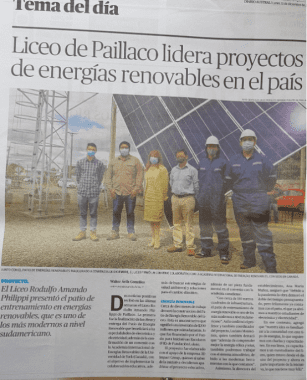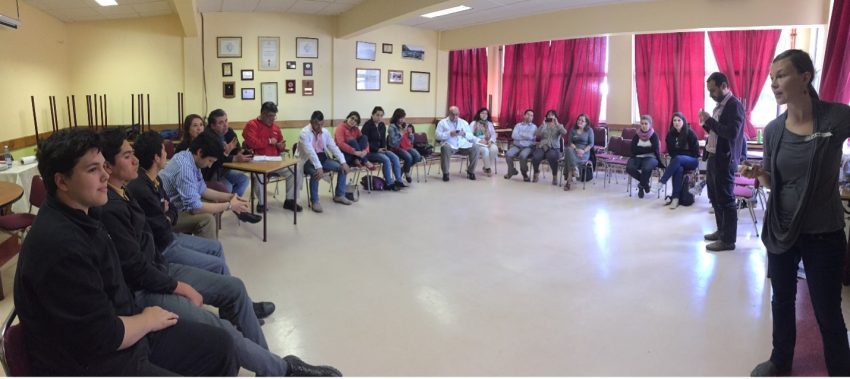Renewable Energy Education as an Opportunity for Engaged Scholarship: The Case of Austral University and the Paillaco Voc-Tech in Southern Chile
Thursday, August, 29th, 2024 News
By: Patricio Belloy
Austral University of Chile
Many of us feel that these are complicated years for scholars working in higher education, both globally and locally. The rise of post-truth and populism, channeled as misinformation through social media, is fueling a rejection of the value of expertise in general and discontent toward some of its traditional sources in particular: universities, research centers, think tanks, and similar organizations.
Unsurprisingly, the lack of trust in science comes from the extremes of the political spectrum, accusing many universities of perpetuating elitism and the abandonment of the real problems of the people. In the case of smaller and historically underfunded universities that have helped thousands of students achieve social mobility, these accusations go exactly in the opposite direction of their core mission.
Trolls and bullies are everywhere, but there might also exist some endogenous reasons for this general perception to emerge. We know our universities are prone to an excess of entitlement, painfully slow change, inefficiencies, and the pursuit of interests that, in some cases, create passive attitudes toward internal corruption. Even worse, those behaviors often go hand in hand with too much inward-looking, instead of focusing on the impact on the quality of life of the communities we serve. Many of our universities may be harvesting the product of years of detachment from our communities, their expectations, and their needs.
How can we reverse this situation? We believe that we need to be more intentional not only in working with communities but also in learning from them: from their day-to-day resilience and how they creatively deal with their challenges, such as budget constraints or their struggle to bridge the gap between what is desired and what is possible.
Nine years ago, a team from Austral University of Chile (UACh), one of the largest universities in Southern Chile, decided to put into practice this potential for increased engagement by partnering with the school community of the Liceo Bicentenario Rodulfo Amado Philippi of Paillaco (Paillaco Voc-Tech). Paillaco is located 45 km (around 29 mi) from Valdivia, where the university’s main campus is based. The Paillaco Voc-Tech is an anchor institution in their city and serves over a thousand students coming from urban and rural areas. Most students come from low-income households, with a large share coming from indigenous communities. The Chilean Ministry of Education rates the school with a 93% student vulnerability index, among the highest in the region.
We have been partnering with the school community since 2015, particularly with their Electricity and Electronics Program. During this time, we have accomplished the creation of the first Renewable Energies Specialization for Voc-Tech schools in Chile and contributed to the upgrade of the school to the Bicentenario category, the highest certification given to public schools by the national Ministry of Education.

Local press stating that the Voc-tech high school is a leader in renewable energy development in the country
The origin of this collaboration is our work with the Community Innovators Lab at MIT (MIT-CoLab) in a 4-year project to promote entrepreneurial skills in the region of Los Ríos, which was funded and supported by the Talloires Network’s Youth Economic Participation Initiative (YEPI). Around 2014, during the implementation of the project, we identified an expansion in the use of renewable energy technology in urban and rural areas and a need for more training in these skills, linking it to the untapped potential of teachers and students from the Paillaco Voc-Tech’s Electricity and Electronics Program. As a tripartite partnership, we designed a strategy to provide teachers and students with skills in renewable energy and entrepreneurial abilities for employability, capitalizing on MIT-CoLab’s experience with participatory methods and democratic change, UACh’s expertise in human development approaches, and Paillaco Voc-Tech’s deep understanding of local problems and potentials.
The project was nested as part of CoLab’s Economic Democracy program. The long-term goal was that a growing share of the local supply of renewable energy services – installation, maintenance, and repair of photovoltaic equipment – would come from young people graduating as technicians in electricity and electronics from the Paillaco Voc-Tech. In 2015, we designed renewable energy content for students and started offering training for teachers. One year later, the first cohort of students received renewable energy education and helped design and implement a small renewable energy lab in the Paillaco Voc-Tech, supported by UACh and a local company. Most importantly, that same year, we ran a Fundamental Human Needs workshop to help align the school community with the transition toward a renewable energy teaching center. Subsequently, the Paillaco Voc-Tech obtained approval to issue the first official specialization in renewable energy authorized for Voc-Tech high schools in Chile. By 2018, the new cohorts were receiving the fully developed curricula in renewable energy education, and the first graduates found jobs in the field of renewable energy.
The project continued throughout the Chilean riots of 2019 and the COVID-19 pandemic. Online classes made it difficult to gain the practical experience needed, but the school’s management and teachers continued supporting the project. Their success eventually helped them obtain competitive funding to build the most advanced training facility for a Voc-Tech high school in the country, which was accomplished by the end of 2022. In parallel, 14 students, along with schoolteachers and staff, traveled to Canada to participate in a renewable energy tour, invited by faculty from the University of York. The tour was funded by donations from local farmers and business owners.
Last year, the journey of this partnership with the Paillaco Voc-Tech made it to the national media. Several companies and individuals committed to supporting the project and expanding it to incorporate electro-mobility content and more equipment.

Conducting a Fundamental Human Needs workshop with the school community, including parents, students, teachers, and staff
This is how we are helping to rebuild trust between the community and the institutions that can provide them with expert advice. As scholars, we are not always in control of how our institutions are managed and how they address the many inefficiencies described in the first paragraphs. However, we can help reverse inward looking and build thriving collaboration with the community and its anchor institutions, helping them satisfy their needs and meet their missions and expectations. Our partnership is more alive than ever, and the generous support from Talloires Network and OSUN is helping us showcase this example of engaged work between academia and the organized community to the whole world.